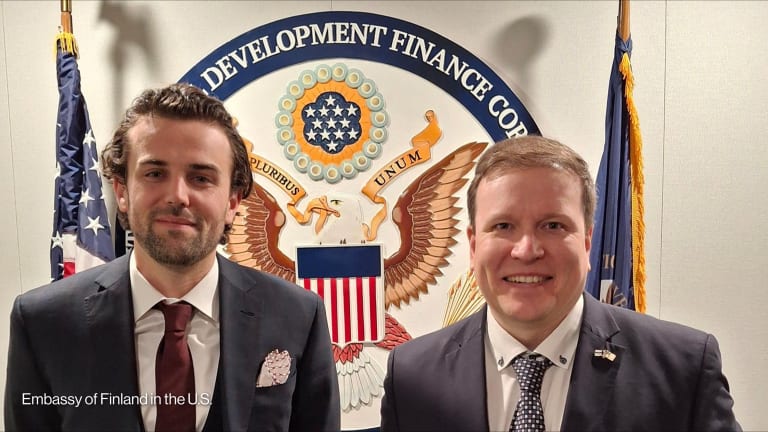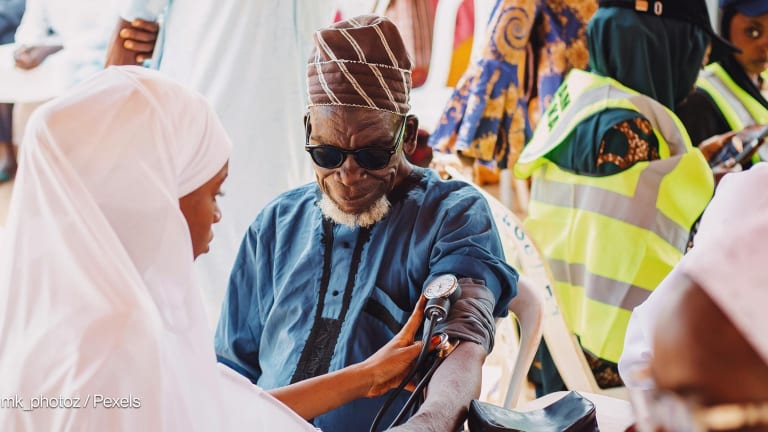
Between black walls of impenetrable forest, the huge Congo river glides along more than a mile wide. What strikes you when visiting the Congo, as I did last month, is how little it has changed since Henry Stanley first navigated the great river almost 150 years ago. Dotted along its bank are small villages. Their inhabitants have no electricity, no sanitation, no mobile phones or internet, no roads, almost no connection with the world outside. The vast majority still exist, as they did in Stanley's day, through subsistence farming and paddling wooden canoes along the river searching for fish.
I went to this remote part of the world to visit two palm oil plantations owned by Feronia, a company CDC financed in late 2013. We flew first to Kisangani, a town of 1 million people, and less than a four-hour flight from the capital Kinshasa. A further four hours downstream on a small motorboat is Feronia’s Lokutu plantation. The journey to their Yaligimba plantation is four more hours down river.
Feronia controls PHC, the Congolese company operating the plantations. Founded by Unilever in 1911, it has been producing palm oil for local consumption ever since. It remained in Unilever's hands through independence from Belgium in 1960 and through subsequent rebellions and civil wars.
CDC kicks off new strategy with eye toward riskier investments
The Department for International Development will increase the amount it invests through the United Kingdom's development finance institution, CDC, to allow it to make riskier investments. But will they be risky enough?
During the most difficult periods, the local senior management and a core staff of 3,000 people kept the business running to the best of their ability, often at great personal risk. Despite their efforts, the years of underinvestment and disruption severely affected operations, and when Feronia acquired PHC from Unilever in 2009, the business was nearly extinct.
CDC and the other shareholders, supported by a group of development finance institutions from Germany, the Netherlands, and Belgium, have funded a redevelopment of the PHC plantations while committing to zero deforestation. We did this because the company has huge potential. As the trees replanted over the past seven years come into production, revenues will rise and costs will fall. We also did it because without our investment, it was unlikely that this historic company — which employs thousands of workers in a region where there is virtually no other formal employment — would have survived. The company has replanted old acreage left to rot, they’ve restored and expanded the mills, extended and modernized the health care facilities, renovated housing, drilled new drinking water boreholes, and secured 8,000 jobs in an area with no other employment opportunities. Those employees support a wider population of around 45,000 people, many of whom are children.
The challenges of doing business here are unique.
The first challenge is the widespread lack of public services and basic infrastructure. The only visible evidence of the state are the soldiers, police, and a network of officials focused mostly on tax collection. Feronia is subject to 178 different taxes — including loading, offloading, production, and employment. Government reportedly employs 1 million administrators in a country with just 200 formal companies — so every one of these businesses is guaranteed a great deal of attention. Yet the government struggles to provide the resources to maintain a road system, basic levels of hospital and school provision and — at least in the areas of the plantations — sanitation, power, or clean water.
Second is logistics. There are few functioning roads in the DRC. That isn’t because they never existed. In 1960 it was possible to travel by car the 1,200 kilometers from Kinshasa to Kisangani in two days. Today that same trip would take weeks. The small number of railroads that existed have long since disappeared. The only way to transport goods is on the river. That takes time. Three weeks downstream from Lokutu to Kinshasa and four weeks to return. The journey is subject to long delays, theft, and taxes at almost every step. Feronia needs to import large pieces of heavy industrial equipment to support its mills. This can only be done through the DRC’s large port at Matadi, meaning more delays and costs.
Third is the challenge of building a management team and workforce. The local education system is run by government and lacks investment. Countrywide, illiteracy is 77 percent. Experienced managers, whether from Europe or other African countries, are hard to find, expensive, and difficult to attract to such a remote location.
Fourth is the challenge of working and providing locally. Feronia is the only employer for hundreds of kilometers. More than 3,000 children are born every year in the plantation hospitals. They need water, schools, sanitation, and better housing. They need health care: 40 percent of deaths in the local hospitals still come from childhood malaria. Sadly, help is unlikely to come from government. Grants are helpful but don’t provide permanent solutions. The life-changing ingredient is an employer with a sustainable business willing to invest not just in jobs, but in critical social infrastructure.
Lastly comes the environment challenge. DRC has the second largest rainforest in the world. Feronia plants only on brownfield areas that have already been planted and adheres to strict global environmental standards. In 2018, the plantation will be run entirely by palm oil biomass. This will power not just the mill, but also much of the local community.
Since 2013, CDC and its partners have invested over $100 million in Feronia. We have not yet made any financial return while Feronia loses money. However, conflict permitting, we expect the company to become profitable soon, as new infrastructure has allowed it to more than double production and as the thousands of recently planted trees reach maturity. CDC’s investment has helped deliver improved engagement with the local community and better education for local children, who are the company’s potential future employees. Through continued investment in the plantations, a sustainable business that protects and improves the lives of workers and community alike can be built.
Support for DFIs such as CDC is growing among all major developed countries. They recognize that only private sector development can bring us close to achieving the Sustainable Development Goals. Meanwhile, the impact investment community grows apace with almost every major financial institution showing interest. This is hugely positive, but a visit to the DRC and Feronia graphically illustrates the sheer difficulty of investing successfully and creating real developmental impact in the most fragile and conflict affected states.
Why do we do this? For the same reason CDC was created almost 70 years ago: to invest in the most difficult places in a way that makes a lasting difference. A trip down the Congo river demonstrates that this work has never been more necessary and more valuable than it is today.
Join the Devex community and access more in-depth analysis, breaking news and business advice — and a host of other services — on international development, humanitarian aid and global health.








